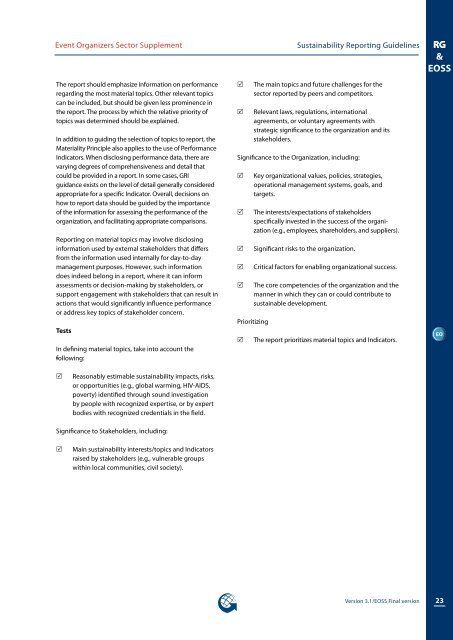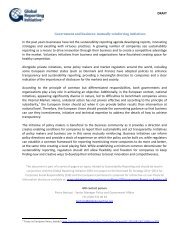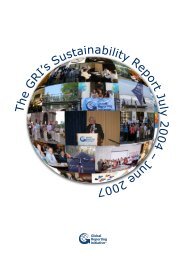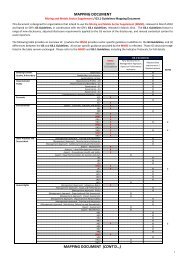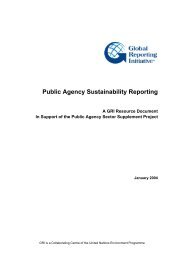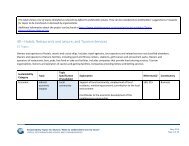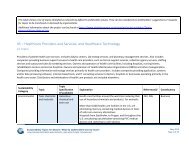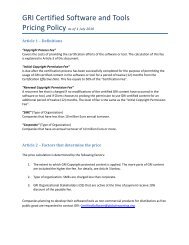Event Organizers Sector Supplement - Global Reporting Initiative
Event Organizers Sector Supplement - Global Reporting Initiative
Event Organizers Sector Supplement - Global Reporting Initiative
Create successful ePaper yourself
Turn your PDF publications into a flip-book with our unique Google optimized e-Paper software.
<strong>Event</strong> <strong>Organizers</strong> <strong>Sector</strong> <strong>Supplement</strong><br />
The report should emphasize information on performance<br />
regarding the most material topics. Other relevant topics<br />
can be included, but should be given less prominence in<br />
the report. The process by which the relative priority of<br />
topics was determined should be explained.<br />
In addition to guiding the selection of topics to report, the<br />
Materiality Principle also applies to the use of Performance<br />
Indicators. When disclosing performance data, there are<br />
varying degrees of comprehensiveness and detail that<br />
could be provided in a report. In some cases, GRI<br />
guidance exists on the level of detail generally considered<br />
appropriate for a specific Indicator. Overall, decisions on<br />
how to report data should be guided by the importance<br />
of the information for assessing the performance of the<br />
organization, and facilitating appropriate comparisons.<br />
<strong>Reporting</strong> on material topics may involve disclosing<br />
information used by external stakeholders that differs<br />
from the information used internally for day-to-day<br />
management purposes. However, such information<br />
does indeed belong in a report, where it can inform<br />
assessments or decision-making by stakeholders, or<br />
support engagement with stakeholders that can result in<br />
actions that would significantly influence performance<br />
or address key topics of stakeholder concern.<br />
Tests<br />
In defining material topics, take into account the<br />
following:<br />
R<br />
R<br />
Sustainability <strong>Reporting</strong> Guidelines<br />
The main topics and future challenges for the<br />
sector reported by peers and competitors.<br />
Relevant laws, regulations, international<br />
agreements, or voluntary agreements with<br />
strategic significance to the organization and its<br />
stakeholders.<br />
Significance to the Organization, including:<br />
R<br />
R<br />
R<br />
R<br />
R<br />
Key organizational values, policies, strategies,<br />
operational management systems, goals, and<br />
targets.<br />
The interests/expectations of stakeholders<br />
specifically invested in the success of the organization<br />
(e.g., employees, shareholders, and suppliers).<br />
Significant risks to the organization.<br />
Critical factors for enabling organizational success.<br />
The core competencies of the organization and the<br />
manner in which they can or could contribute to<br />
sustainable development.<br />
Prioritizing<br />
R<br />
The report prioritizes material topics and Indicators.<br />
RG<br />
&<br />
EOSS<br />
EO<br />
R<br />
Reasonably estimable sustainability impacts, risks,<br />
or opportunities (e.g., global warming, HIV-AIDS,<br />
poverty) identified through sound investigation<br />
by people with recognized expertise, or by expert<br />
bodies with recognized credentials in the field.<br />
Significance to Stakeholders, including:<br />
R<br />
Main sustainability interests/topics and Indicators<br />
raised by stakeholders (e.g., vulnerable groups<br />
within local communities, civil society).<br />
Version 3.1/EOSS Final version<br />
23


